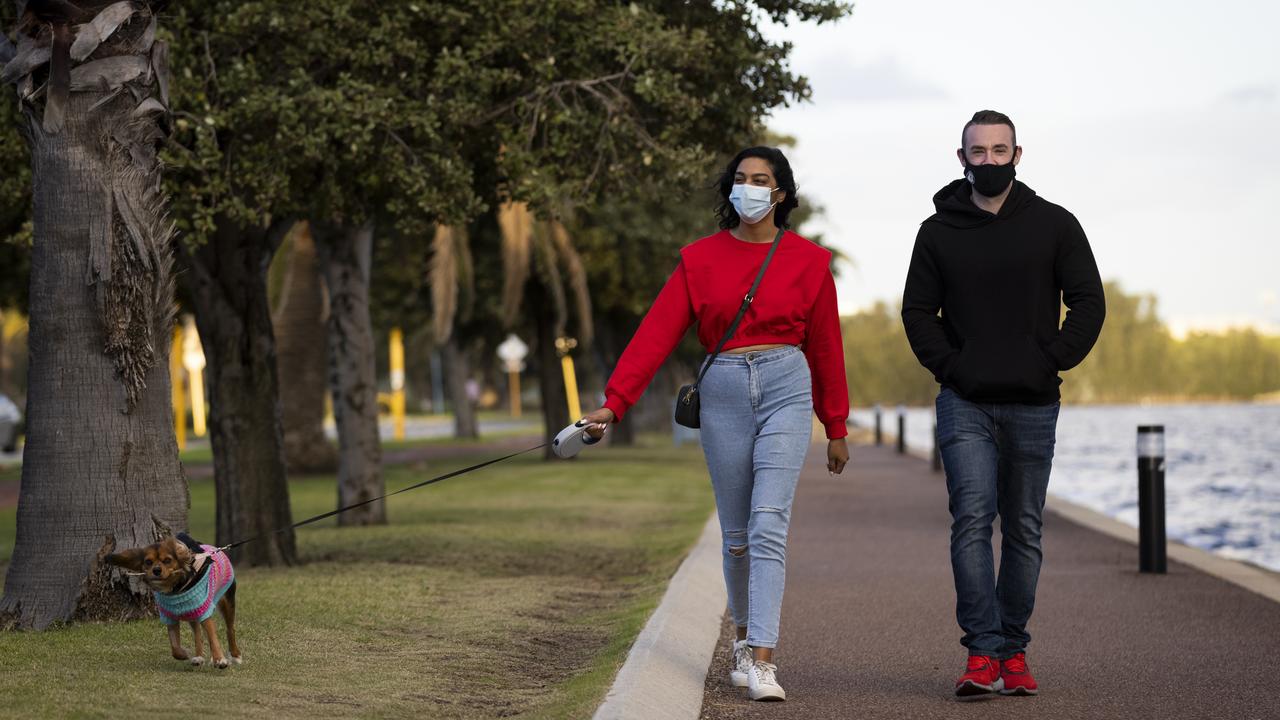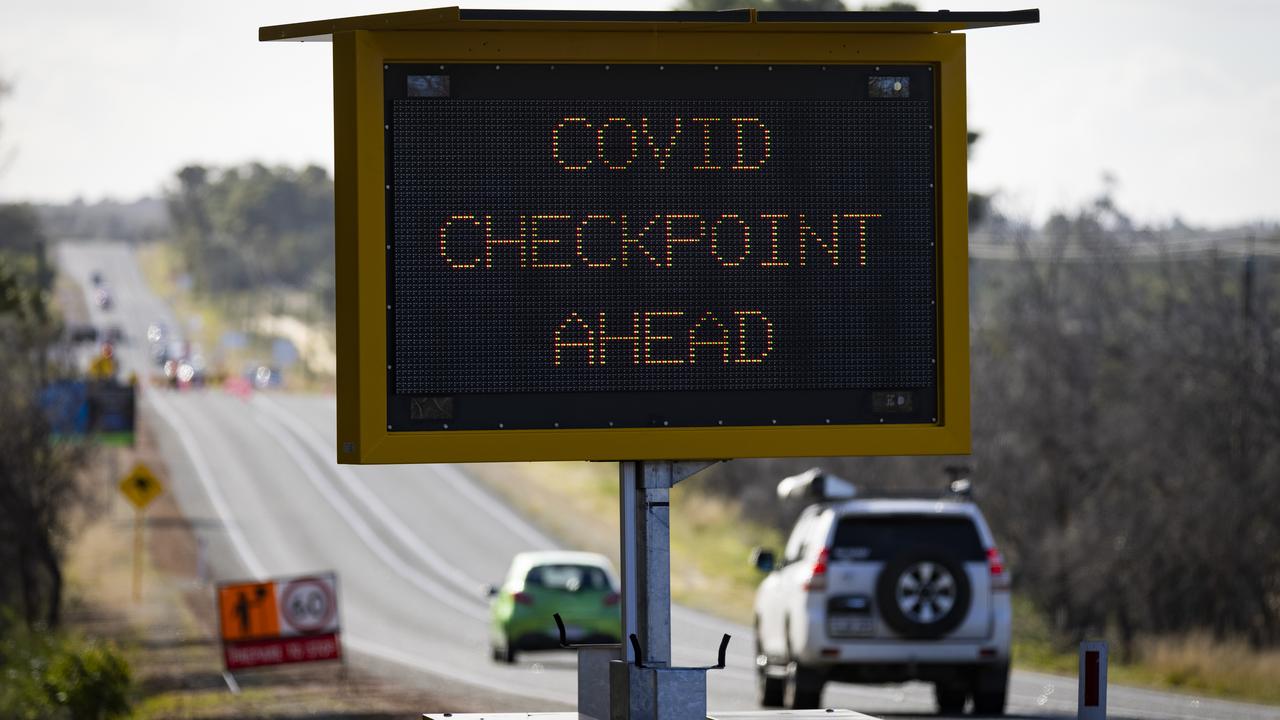World reacts to ‘ridiculous’ Australian lockdowns
With roughly 12 million Australians in four states now under Covid-19 lockdown, people overseas are “laughing” at the “ridiculous” situation.
With roughly 12 million Australians in four states now ordered into Covid-19 lockdown, the rest of the world has looked on with a mixture of admiration, confusion and pity.
Queensland’s announcement of a snap three-day lockdown on Tuesday, after just two locally transmitted cases of the virus, came after similar stay-at-home orders for parts of NSW, the Northern Territory and Western Australia.
Other states and territories have reintroduced restrictions such as mandatory masks and venue limits.
Across the entire country of 25 million on Tuesday, there were roughly two dozen new cases reported.
Just one person is currently in ICU with the virus – in a NSW hospital.
Spoke to a friend in USA last night. Told him we're in lockdown over 1 case. He laughed. What else can he do. It's ridiculous.
— Dr David Keatley (@DaveKeatley) June 28, 2021
Well, Australia one-upped (or one-downed) him
Behold
The 0 cases lockdown
If you're thinking this is good, you're not. pic.twitter.com/nyowwUP3kA
“Spoke to a friend in USA last night,” criminology lecturer Dr David Keatley from Perth’s Murdoch University wrote on Twitter earlier this week.
“Told him we’re in lockdown over one case. He laughed. What else can he do. It’s ridiculous.”
He shared a screenshot of an article about new restrictions in South Australia, despite no new cases there.
“Well, Australia one-upped (or one-downed) him,” Dr Keatley wrote. “Behold. The zero cases lockdown. If you’re thinking this is good, you’re not.”
Health authorities have justified the harsh measures due to the highly transmissible nature of the Delta variant, which is believed to spread via “fleeting contact” of “five to 10 seconds”, unlike the 10 to 15 minutes of the original strain.
“The outbreak is still extremely mild by global standards – no one has died from Covid in Australia since last year,” The New York Times wrote. “But health officials expect case numbers to increase over the coming days as the Delta variant spreads through close contacts.”

CNN noted that Australia had been “celebrated for its initial response to the Covid-19 pandemic, and for getting its economy more or less back on track long ago”.
“But with that security has come complacency, particularly in the federal government, which failed to secure enough vaccine doses to prevent the regular ‘circuit breaker’ lockdowns that come every time a handful of cases emerge, or even the longer restrictions that Sydney is experiencing now,” CNN wrote.
“Australia’s borders, controlled by strict quarantine measures, have been all but shut for more than a year. Now Australians, who basked in their early successes, are wondering how much longer this can go on.”
Bloomberg said the latest outbreaks showed “the limits of Australia’s so-called ‘Covid-zero’ strategy, which has relied on closed international borders and rigorous testing to eliminate community transmission of the virus”.
“While nations such as the UK and US are preparing to open up their economies after widespread vaccinations, a slow rollout in Australia means the economy, and particularly domestic tourism, remains vulnerable,” Bloomberg wrote.
A two-week lockdown begins in Sydney as Australia battles 'new phase' of the pandemic. But Sydney Morning Herald journalist @latikambourke says "Zero Covid measures come with huge costs which see Australia alone in the world in locking citizens in the country." @JuliaHB1pic.twitter.com/pkrLgEkrTo
— talkRADIO (@talkRADIO) June 29, 2021
Latika Bourke, The Sydney Morning Herald’s correspondent based in London, told local radio there that Australia’s “‘zero Covid’ measures come with huge costs”.
“Obviously very different to the death tolls we’ve seen in other countries, but some of those costs for example see Australia alone in the world in locking citizens inside the country,” Bourke told talkRadio.
Host Julia Hartley-Brewer said the “fortress Australia” approach seemed to be “very, very popular”.
“Even Scott Morrison said there was no chance of Australia opening its borders to non-Australians before 2022,” Hartley-Brewer said.
“Realistically, how long can Australia remain like this? Because even when they’ve got 100 per cent of the population vaccinated, if and when they open up, at some point, there will be people who die from getting Covid, because it doesn’t provide 100 per cent immunity. Are the Australians prepared for that?”

Bourke replied, “Well this is the issue Australia is grappling with. It’s one thing to have zero Covid, but it’s also important to note that it’s not zero cost.”
According to the BBC, “experts are unanimous that the current outbreaks must be contained with lockdowns and other restrictions”.
“Experts warn that Delta is likely to have changed Australia’s Covid landscape for good,” the BBC wrote.
“That could mean measures like mask-wearing in public will need to be mandatory for some time yet.”
One expert who does not agree is UNSW economist Gigi Foster, an outspoken voice against lockdowns since last year.
“It’s complete madness,” Professor Foster told Sky News Australia.
“Even a year ago it was clear to me lockdowns were not the way to go and I was saying so publicly, but I do feel this most recent Sydney lockdown has really gotten under people’s skin.”
Prof Foster said there were enormous human costs associated with lockdowns and governments had never produced a true cost-benefit analysis.
When will people just admit that they got duped into accepting tyranny?
— ZUBY: (@ZubyMusic) June 29, 2021
The levels of cope are unreal.
You got played. It's ok. Most people did.
She said the “false dichotomy of the economy versus lives” was “simply inappropriate and ethically offensive”.
“I’m hopeful that perhaps we may be in a position where politicians will start to realise that maybe the tide is turning and maybe their power trip is coming to an end,” she said.
The Associated Press highlighted the updated advice for the AstraZeneca vaccine, which will now be offered to younger age groups despite earlier changes to health advice after two women died from blood clots.
“The new clusters of a variant thought to be more contagious have highlighted the nation’s vulnerability through a slow vaccine rollout,” the Associated Press wrote.
“Some epidemiologists argue the government should speed up the rollout by reducing the gap between AstraZeneca jabs from 12 to eight weeks. But some Australians are now refusing to take a second shot because of the evolving perception of the blood clotting risk. The NSW state government is highlighting vaccines’ apparent successes in the current Sydney cluster.”




